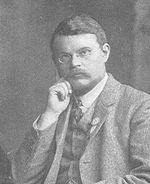
Harold Bolingbroke Mudie
Encyclopedia

London
London is the capital city of :England and the :United Kingdom, the largest metropolitan area in the United Kingdom, and the largest urban zone in the European Union by most measures. Located on the River Thames, London has been a major settlement for two millennia, its history going back to its...
, 30 June 1880 – 6 January 1916) was a British
United Kingdom
The United Kingdom of Great Britain and Northern IrelandIn the United Kingdom and Dependencies, other languages have been officially recognised as legitimate autochthonous languages under the European Charter for Regional or Minority Languages...
esperantist
Esperantist
An Esperantist is a person who speaks or uses Esperanto. Etymologically, an Esperantist is someone who hopes...
. He served as the first President of the
President of the World Esperanto Association
The President of the World Esperanto Association is the elected leader of the World Esperanto Association and is chief executive of the UEA steering committee .-History:...
World Esperanto Association
World Esperanto Association
The World Esperanto Association is the largest international organization of Esperanto speakers, with members in 121 countries and in official relations with the United Nations and UNESCO. In addition to individual members, 70 national Esperanto organizations are affiliated to UEA...
.
He learnt Esperanto
Esperanto
is the most widely spoken constructed international auxiliary language. Its name derives from Doktoro Esperanto , the pseudonym under which L. L. Zamenhof published the first book detailing Esperanto, the Unua Libro, in 1887...
in 1902, having read about it on the Review of Reviews
Review of Reviews
The Review of Reviews was a noted family of monthly journals founded in 1890-93 by British reform journalist William Thomas Stead...
. In November 1903 he founded the gazette The Esperantist, thanks to a financial guarantee by William Thomas Stead
William Thomas Stead
William Thomas Stead was an English journalist and editor who, as one of the early pioneers of investigative journalism, became one of the most controversial figures of the Victorian era. His 'New Journalism' paved the way for today's tabloid press...
; nevertheless, the magazine proved profitable. When the magazine was united with The British Esperantist, in January 1906, he joined its editorial committee. He was a strong supporter of the work to publish the New Testament
New Testament
The New Testament is the second major division of the Christian biblical canon, the first such division being the much longer Old Testament....
in Esperanto.
He was an advocate for the promotion of Esperanto in other countries, several of which he visited during Universal Esperanto Congresses.
He first served as vice-president, then as president (from 1912 to 1916) of the Esperanto Association of Britain
Esperanto Association of Britain
The Esperanto Association of Britain is a registered educational charity whose objective is to advance the education of the public in the international language Esperanto....
. In 1908 he became president of the newly-founded World Esperanto Association
World Esperanto Association
The World Esperanto Association is the largest international organization of Esperanto speakers, with members in 121 countries and in official relations with the United Nations and UNESCO. In addition to individual members, 70 national Esperanto organizations are affiliated to UEA...
. Eduard Stettler nominated him "president since his birth", because of his great rhetorical ability. He was a member of the Lingva Komitato, the precursor to the current Academy of Esperanto.
After the beginning of the first World War, he joined the army and rapidly became captain. In January 1916 he died in a car accident in France
France
The French Republic , The French Republic , The French Republic , (commonly known as France , is a unitary semi-presidential republic in Western Europe with several overseas territories and islands located on other continents and in the Indian, Pacific, and Atlantic oceans. Metropolitan France...
. A new president of the World Esperanto Association was not appointed until 1919--the previous vice-president, Hector Hodler
Hector Hodler
Hector Hodler was a Swiss Esperantist who had a strong influence on the early Esperanto movement....
.

